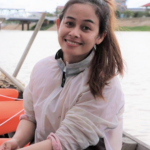This is the fourth in a monthly Mekong data seminar series featuring presentations of recent studies and papers by authors with an interactive discussion about the data and why it matters.
The 3S Basin is one of the largest tributary basins of the Mekong system. It contributes around 20% of the river’s annual flow. The transboundary 3S rivers (Sekong, Sesan, and Srepok) run through Vietnam, Laos, and Cambodia and because of their proximity to Cambodia’s Tonle Sap Lake and Vietnam’s Mekong Delta, they provide important environmental services to the Mekong’s robust fisheries and agricultural sectors. Over the last three decades, hydropower dams have been built in each of the 3S rivers, yet little is known about how the operations of these dams alter the Mekong’s flood pulse. Join Brian Eyler for a discussion of how for the first time ever satellite imagery can shed a light on the operations of the 20 largest dams in the 3S basin and their seasonal and monthly impacts to the Mekong at large.
Featured Speaker

Brian Eyler, Southeast Asia Program Director, The Stimson Center
Brian Eyler is an expert on transboundary issues in the Mekong region and specializes in China’s economic cooperation with Southeast Asia. He spent more than 15 years living and working in China and has conducted extensive research with stakeholders in the Mekong region. He is widely recognized as a leading voice on environmental, energy, and water security issues in the Mekong. He is co-lead on the Mekong Dam Monitor and his first book, Last Days of the Mighty Mekong, was published in 2019.
Discussant

Savoeurn Soum, PhD Student at Royal University of Phnom Penh
Savoeurn Soum is a PhD student in Applied Ecology and Management at the Royal University of Phnom Penh, who is supported by the Wonders of the Mekong Project. The increase in population, infrastructure, agricultural land, dams, deforestation, and climate change are putting pressure on ecological functions in the Mekong region, causing food safety and security concerns. For these reasons, Savoeurn studies water quality and food web production in the Mekong River sub-basin and Tonle Sap Lake.

Bunthoeurn MAK, Program Manager and Network Coordinator, The NGO Forum on Cambodia
Mr. Bunthoeurn Mak has served as the Network Coordinator with the NGO Forum on Cambodia for more than five years, working with particular focus on water governance, the sustainability of the Mekong River, and inclusivity–particularly for full participation of those affected by hydropower dams. He is also a Program Manager and also Coordinator of the Rivers Coalition in Cambodia project of the NGO Forum. Prior to joining the NGO Forum, he worked with Fondazione ACRA to address water management and plastic reduction in Cambodia and with other NGOs on issues like resource governance and communications.
Moderator

Courtney Weatherby, Southeast Asia Deputy Director, The Stimson Center
Courtney Weatherby’s research focuses on sustainable infrastructure and energy development challenges in Southeast Asia and the Indo-Pacific, particularly at the nexus of issues in food, water, and energy in the Greater Mekong Subregion. Weatherby was lead author on a range of technical and policy studies on system-scale planning for hydropower and cross-border electricity trade. She supports the development and management of the Mekong Dam Monitor and Mekong Infrastructure Tracker.
